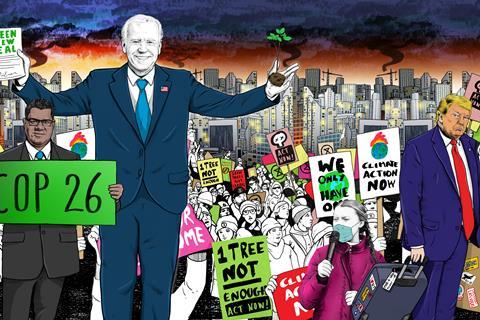The race to COP26 is on. A year and a half after Property Week and UKGBC first launched the Climate Crisis Challenge campaign, the much-anticipated – and long-delayed – conference is finally visible on the horizon.

Of course, a lot can happen between now and November. If Greta Thunberg and former UN climate chief Yvo De Boer get their way, the conference could well be pushed back again.
But assuming it does go ahead, there is a lot of lost ground to make up. So what should the industry be doing now to prove it is taking the climate crisis seriously and is ready to make the transition from words to actions?
The geopolitical backdrop surrounding the conference offers hope, but also cause for concern. Last month, US president Joe Biden held a White House summit with world leaders in which he pledged to cut the US’s greenhouse gas emissions by between 50% and 52% below 2005 levels by 2030.
Not to be outdone, Canadian prime minister Justin Trudeau said during the summit his country would up its goal to cut carbon emissions from 30% below 2005 levels by 2030 to between 40% and 45% below 2005 levels by 2030. Summarising the prevailing mood at the event, French president Emmanuel Macron said: “Basically, 2030 is the new 2050.” Last month also saw the UK government set in law the “world’s most ambitious climate change target” to cut emissions by 78% by 2035 compared with 1990 levels.
If it sounds as though each government is trying to ratchet up its activity, that is precisely the aim of COP26. The Paris Agreement back in 2015 put it in writing that every five years, governments must make their net zero targets bolder. COP26 would have been that five-year milestone in 2020 were it not for the pandemic.
Everything should be going through a kind of net zero funnel
Julie Hirigoyen, UKGBC
For Julie Hirigoyen, chief executive of UKGBC, this means that the stakes could not be higher. “If the bit of the framework that says ‘ratcheted up ambitions every five years’ doesn’t work, and isn’t cemented and proven to work so that COP26 can finally be a milestone, then effectively Paris has failed,” she says.
The possibility of failure should not be taken lightly. Not every major country has made such bold commitments, and Hirigoyen expresses anxiety about the reticence in particular of the Chinese government.
“China attended Biden’s virtual summit, but China didn’t announce any more ambitious targets,” she says. “And there were some quite alarming messages coming from the foreign minister around the preconditions for China to co-operate on climate. So, I would like to see some of those tensions resolved ahead of COP26.”
The UK government’s commitments on climate have also come under fire. Although the government has made bold statements, Peter Fisher, partner at Bennetts Associates, is frustrated by the backtracking it has made on actual policy.
Not mincing his words, Fisher accuses it of making commitments so far into the future that it won’t need to be held accountable for them. “I don’t believe a word this government says,” he says.
One of the reasons for Fisher’s scepticism is the scrapping of the Green Homes Grant less than a year after it was announced. He argues that retrofitting buildings is vital to tackling the climate crisis and insists that government needs to treat the challenge like an infrastructure project similar in scope and scale to HS2.
Complacency concerns
He also fears the government has become complacent as a result of the reduction in emissions to date. This, he notes, was the low-hanging fruit of a transition from coal energy to renewables and gas. Now, the real work of retrofitting buildings and converting to 100% renewable energy needs to begin, he says.
Hirigoyen is worried not only about the seriousness of the UK government’s commitments to climate, but also about policies less obviously connected with climate, such as the government’s decision to cut international aid from 0.7% of GDP to 0.5% of GDP.
Doing so does not send the right signal and may force developing economies to rely on investing in fossil-fuel energy as a way of quickly recovering from the pandemic, she argues.
On government climate policy in general, her frustration is that it is not joined up. “Everything should be going through a kind of net zero funnel that asks: ‘Does this or does this not enable us to achieve that net zero target?’”

For Hirigoyen, climate policy is important for the real estate industry because the sector accounts for such a significant proportion of the emissions the UK government is intent on reducing. “You know the stats as well as I do. The sector represents up to 40% of our emissions in the UK, so we can’t get there without this sector,” she says.
She adds that climate policy is also important to the real estate industry because of the way the two relate to each other. “I feel like the market is transitioning faster than government and international policy,” she says.
“But if you have got an internationally agreed transition pathway that is even faster and stronger, then the real estate industry’s response as a marketplace will be that much stronger. It’s what is often called an ‘ambition loop’.”
The private sector side of this ‘ambition loop’ is evidenced by the rush of net zero carbon commitments businesses have been making over the past year or so. At the end of March this year, the UK government bragged that almost one third of FTSE 100 companies had committed to the UN’s Race to Zero, a pledge to be net zero by 2050.
Hirigoyen would like to see more businesses do the same alongside signing up to the WorldGBC’s Net Zero Carbon Buildings Commitment in the run-up to COP26.
Ambition for action
Basil Demeroutis, managing partner of FORE Partnership, believes that the real estate sector has more ambition for action than the government. He personally says he would support tougher regulation on businesses to do better. “But, in the absence of that, I don’t think we should let that hold us back,” he says. “I don’t need someone in Whitehall to tell me that I should be buying steel with more recycled content. That’s blindingly obvious.”
Does this increase the likelihood of greenwashing, with businesses marking their own homework? Demeroutis admits it does. “But at least we’re submitting the homework,” he says.
Demeroutis also stresses that there is no excuse for real estate businesses not to be making progress between now and COP26 – especially those that have not yet started to make commitments to net zero carbon.
For those businesses that are just starting out on that journey, David Jackson, board director of ESG and head of planning at Climate Crisis Challenge lead partner Savills, says that the first step is for a business to understand how it is contributing to the climate crisis. “In other words, establishing the baseline,” he explains. “If you don’t know where you are, you won’t know where you are going.”
There are still some dinosaurs out there complaining this is an injustice
Basil Demeroutis, FORE Partnership
Omega Poole, partner at fellow challenge lead partner Mishcon de Reya, adds that the “minimum” that real estate businesses should be doing between now and COP26 is making sure they are aligned with the Paris Agreement objective of restricting global warming to 1.5 degrees above pre-industrial levels.
“That requires a strategy to achieve net zero emissions by 2050, robustly measuring direct and indirect emissions, and setting clear targets to reduce emissions,” she says. “Many property companies have set even more ambitious targets, aiming to be net zero by 2030.”
Meanwhile, Claudine Blamey, head of sustainability and digital strategy at fellow lead challenge partner Argent, says businesses must work with their supply chain to ensure they are reducing embodied carbon in materials.
She adds: “I think it would be useful for an industry group to be formed that would look at developing consensus on things like the definition of net zero carbon – not just buildings but also places, towns etc – and also for a standard to be developed that certifies net zero carbon.”
Demeroutis says the first thing landlords can do right now is to switch their portfolios to 100% renewable energy – if they have not done so already. “That’s like one phone call. It’s not difficult,” he says.
“I have yet to hear a good argument from anybody about why they are buying anything other than electricity from 100% renewable sources,” he adds. Green leases, he argues, are also relatively easy to put in place.
Demeroutis is calling on businesses of all sizes to act rather than making excuses, and rails against those in the industry who are still dragging their heels tackling the climate crisis. “There are still some dinosaurs out there complaining that there is an injustice being levied on real estate owners,” he says.
To cite just one example of this “dinosaur” mentality, Fisher complains that office developers often want to have the brightest lights possible to make the building more appealing in a brochure.
Fisher says this is pointless as human eyes naturally adjust to lower levels of light than some developers insist on installing and many occupiers wind up tearing out fittings immediately after moving in anyway. “It’s like being obsessed with ‘nought-to-60’ times on a car when you never actually use [them],” he says.
The warehouse sector has its share of dinosaurs, too. Martin Cooper, vice-president of project management at Prologis, recalls negotiations with potential occupiers that do not care how environmentally friendly the building is – they just want the cheapest rent possible.
“I’ve certainly experienced discussions like that,” he says. “But, generally, our buildings are market-leading products in great places. Yes, rents are driven by the market, but what we have done over time is refine our specification so that a lot of the effort to reduce embodied carbon in the fabric of the building has been done and is part of our base specification.”
What Hirigoyen wants to see from COP26 is recognition of how integral the property industry’s role is in tackling the climate crisis. Fortunately, should the conference fail to make that connection clear, the likes of Hirigoyen will continue to bang the drum. “It’s definitely not too late,” she says. “It’s crucial that it happens as soon as possible, but it’s not too late.”
From Covid tunnel to net zero funnel
- 1
 Currently reading
Currently readingFrom Covid tunnel to net zero funnel
- 2
- 3

































No comments yet